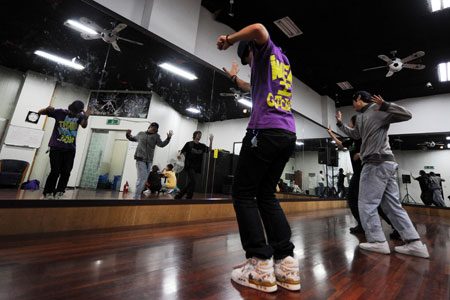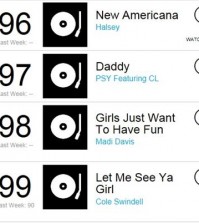- California Assembly OKs highest minimum wage in nation
- S. Korea unveils first graphic cigarette warnings
- US joins with South Korea, Japan in bid to deter North Korea
- LPGA golfer Chun In-gee finally back in action
- S. Korea won’t be top seed in final World Cup qualification round
- US men’s soccer misses 2nd straight Olympics
- US back on track in qualifying with 4-0 win over Guatemala
- High-intensity workout injuries spawn cottage industry
- CDC expands range of Zika mosquitoes into parts of Northeast
- Who knew? ‘The Walking Dead’ is helping families connect
Tough rules protect K-pop star hopefuls
Convicted and bankrupt people banned from running agencies

Apprentices of an entertainment agency dance at a practice room in Sincheon, southern Seoul, in this photo taken in 2009. Many singer and actor wannabes in Korea have found themselves exploited or maltreated by agency operators due to legal loopholes. (Korea Times file)
By Park Si-soo
Starting in the second half of this year, establishing an entertainment agency in Korea will only be possible after approval from the government.
The regulation endorsed by the National Assembly on New Year’s Eve will help prevent young and naive singer and actor aspirants — estimated to be nearly one million nationwide — from falling victim to “rogue” agents who have been accused of exploiting their clients in a bid to maximize profits. It will take six months for the rule to clear all administrative procedures and go into effect.
Tough rules
Under the new regulation, new agencies will need to receive approval from the Ministry of Culture, Sports and Tourism before they recruit trainees. Their board of directors must have at least one executive who has been in the showbiz industry for a minimum of four years. Any agency that has ever been penalized for any type of crime will be ineligible. Those reinstated will be subjected to stricter monitoring mechanisms. Minors and bankrupt individuals will be banned from running agencies.
The rule has also laid the groundwork to punish agency operators who force their trainees to sell sex. Violators will face up to 10 years in prison or a 100 million won ($95,200) fine. Those who push underage entertainers to dress indecently or perform lewdly against their will will be punished. The law also employs stricter rules to protect the right of student entertainers to study and sleep, limiting their work hours to between 10 a.m. and 6 p.m. a day, and 40 hours per week.
The culture ministry hailed the legislation.
“With these new rules, we will have a healthier entertainment industry and make the overall pop culture and related businesses develop by restricting the number of agencies,” said the ministry in a statement. “We will continue working to toughen regulations in the future.”
The revisions to the bill drafted in 2012 was the work of drama-director-turned-lawmaker Park Chang-sik of the ruling Saenuri Party. The first-term lawmaker was inspired to draft the bill following the death of actress Jang Ja-yeon. She was found dead in March 2009 at her home in an apparent suicide. She left behind a handwritten note in which she claimed she was coerced into having drinks and sex with media and business moguls. The memo galvanized the prosecution to launch a large-scale manhunt for high-profile figures allegedly implicated in the case, but failed to produce concrete evidence against the alleged perpetrators.
“Korea’s entertainment industry has grown a lot, but many abuses remain unchecked,” Park said. “This is the very first step to change it. I have more things to do to make the industry more transparent and competitive.”
More changes needed
The lawmaker’s policy assistant Kim Do-hyung told The Korea Times over the phone that Park will soon propose another bill to mandate the use of a state-certified contract form, and to improve the current tough working conditions of shooting crews of independent drama and film productions.
“The bill will be submitted (to the National Assembly) by the end of January with bipartisan support,” Kim said. “Park drafted the bill with 11 other lawmakers of the ruling and opposition parties registered as cosponsors.”
Regarding the state-certified contract form, Kim said the bill, if enacted, will put agencies using uncertified forms at a “considerable” disadvantage in seeking state subsidies. He didn’t elaborate further.
“I think it will proceed as smoothly as the earlier bill because there is no opposition to this issue among lawmakers,” he said.
With no contract form reviewed by a credible organization, many artists have fallen victim to abuse at the hands of entertainment companies, often committing them to notoriously long deals after signing contracts, and forcing them to endure long working hours with little financial reward.
In a related seminar in October, ruling party Chairman Hwang Woo-yea pledged his full support to plug the legal loopholes in the fast-growing entertainment industry.
“Many young people throw themselves into hard training to become superstars like Psy and Girls’ Generation,” Hwang said at the time. “The number of such hard-working trainees is estimated to be one million. Many of them undergo painful experiences such as mistreatment, unfair profit-sharing, and physical or even sexual assault due to legal loopholes. I feel a strong sense of duty to help them by making rules under which they are treated properly.”
Poor treatment of shooting crews for TV dramas and films is a major problem that has dogged the entertainment industry for years.
Most of them belong to independent production companies. They frequently are placed at the bottom of the shooting-site hierarchy, so they are required to handle all kinds of tough work. They are exposed to higher risk of physical injury, but are paid the least.
Nevertheless, they have no legal right to unionize to call for improved working conditions since they are hired on temporary contracts.
The annual income of a crew member is estimated at 6.4 million won on average as of 2009, according to the Korea Broadcasting Actors Union, the latest data available. It showed 74.2 percent of shooting crews work more than 13 hours a day, while only 1.3 percent work eight hours a day. Only 9.2 percent received overtime pay, the data showed.
“It’s truly reprehensible,” lawmaker Park said, recollecting his experiences as a prominent drama director in the 1990s. “Nearly 80 percent of film crews are hired temporarily. Their salary is horribly low and working conditions couldn’t be worse.”
He cited “tight budgets” as the main reason behind what he described as “cruel” working conditions facing film crews.
“Broadcasters want to make dramas for the least amount of money,” the lawmaker said. “With a large portion of the budget set to be paid to a handful of main actors, the fundamental solution for the problem is increasing the budgets.”
















